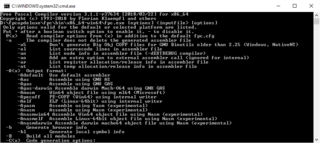 W
WBabel is a free and open-source JavaScript transcompiler that is mainly used to convert ECMAScript 2015+ (ES6+) code into a backwards compatible version of JavaScript that can be run by older JavaScript engines. Babel is a popular tool for using the newest features of the JavaScript programming language.
 W
WThe Design of an Optimizing Compiler, by William Wulf, Richard K. Johnson, Charles B. Weinstock, Steven O. Hobbs, and Charles M. Geschke, was published in 1975 by Elsevier. It describes the BLISS optimizing compiler for the PDP-11, written at Carnegie Mellon University in the early 1970s. The compiler ran on a PDP-10 and was one of the first to produce well-optimized code for a minicomputer. Because of its elegant design and the quality of the generated code, the compiler and book remain classics in the compiler field.
 W
WEiffelStudio is a development environment for the Eiffel programming language developed and distributed by Eiffel Software.
 W
WFree Pascal Compiler (FPC) is a compiler for the closely related programming-language dialects Pascal and Object Pascal. It is free software released under the GNU General Public License, with exception clauses that allow static linking against its runtime libraries and packages for any purpose in combination with any other software license.
 W
WGnuCOBOL is a free implementation of the COBOL programming language. Originally designed by Keisuke Nishida, lead development was taken up by Roger While. Latest developments are now led by Simon Sobisch, Ron Norman, Edward Hart, Sergey Kashyrin and many others.
 W
WIBM COBOL is the name of the COBOL compiler developed for IBM environments. The IBM COBOL compiler is currently supported on z/OS, AIX, VSE/ESA, and z/VM.
 W
WIn computing, a linker or link editor is a computer system program that takes one or more object files and combines them into a single executable file, library file, or another "object" file.
 W
WThe LLVM compiler infrastructure project is a set of compiler and toolchain technologies, which can be used to develop a front end for any programming language and a back end for any instruction set architecture. LLVM is designed around a language-independent intermediate representation (IR) that serves as a portable, high-level assembly language that can be optimized with a variety of transformations over multiple passes.
 W
WPGI was a company that produced a set of commercially available Fortran, C and C++ compilers for high-performance computing systems. On July 29, 2013, NVIDIA Corporation acquired The Portland Group, Inc. As of August 5, 2020, the "PGI Compilers and Tools" technology is a part of the NVIDIA HPC SDK product available as a free download from NVIDIA.
 W
WIn computing, tombstone diagrams consist of a set of “puzzle pieces” representing compilers and other related language processing programs. They are used to illustrate and reason about transformations from a source language to a target language realised in an implementation language. They are most commonly found describing complicated processes for bootstrapping, porting, and self-compiling of compilers, interpreters, and macro-processors.
 W
WZPE Programming Environment formally the Zenith Parsing Engine is a general-purpose compiler, parser and interpreter for the YASS language designed for educational use as well as for its general use. The language it interprets, YASS, is an interpreted, high-level, general-purpose programming language. YASS is largely built upon making the language easy to read and use, with optional support for syntaxes such as curly-bracket syntax. YASS supports dynamic typing. It was started in 2015 as a planned university project but later was changed to be a replacement for another programming language developing at the time known as BlackRabbit Script, also built by Jamie Balfour. ZPE and YASS were designed to help with the automation of scripts by clearing up the inconsistent syntaxes of other scripting languages. The Zenith Parsing Engine powers the underlying parsers including the CSV, JSON and XML parsers.